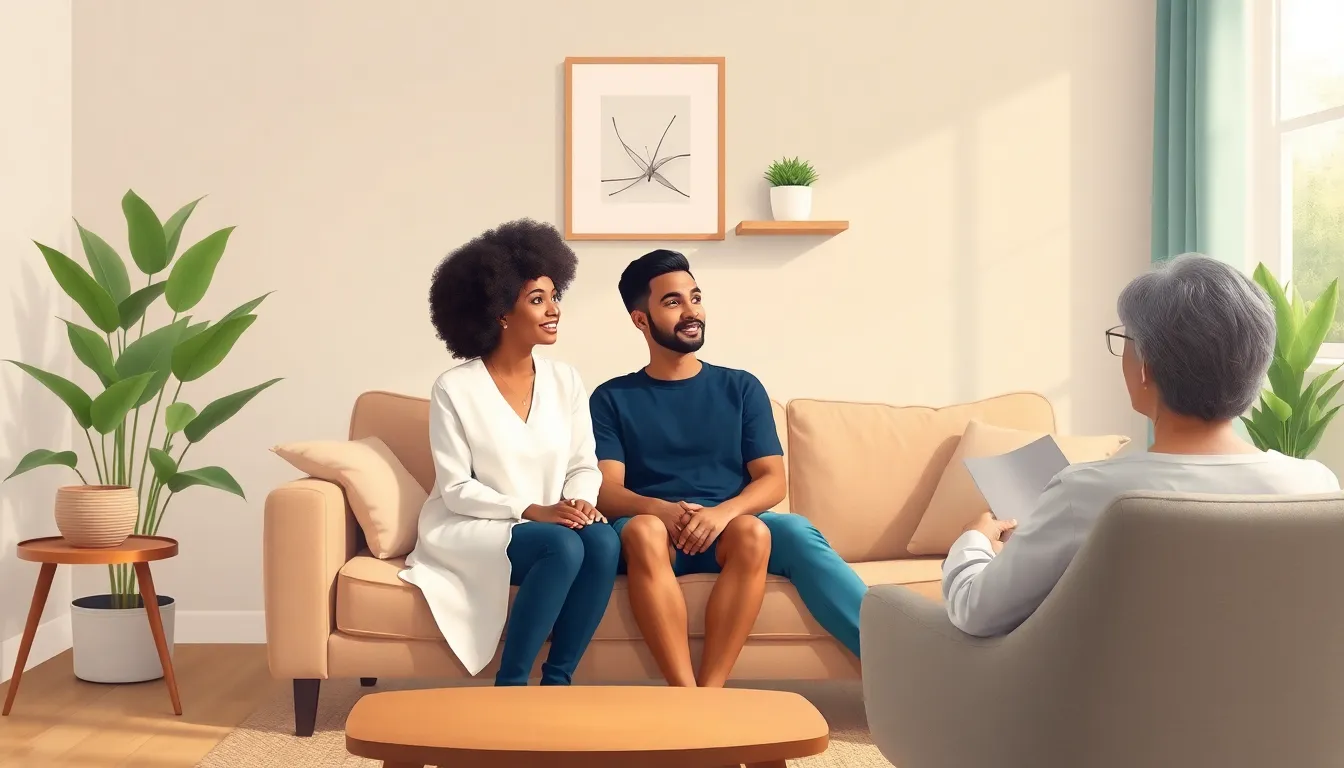Navigating the ups and downs of a relationship can feel like trying to solve a Rubik’s Cube blindfolded. Couples often find themselves stuck in patterns that lead to misunderstandings and frustration. Enter Psychology Today couples therapy—a beacon of hope for those ready to untangle the knots of their relationship.
In a world where communication sometimes resembles a game of charades, skilled therapists help couples rediscover their connection. They provide practical tools and insights to transform conflicts into opportunities for growth. With a sprinkle of humor and a dash of professionalism, couples can learn to tackle their issues head-on while keeping the love alive. Whether it’s learning to listen or just remembering to put the toilet seat down, therapy can be the game-changer every couple needs.
Psychology Today Couples Therapy
Couples therapy focuses on enhancing relationships through effective communication and conflict resolution techniques. In sessions, trained therapists create a safe environment for partners to express their feelings and concerns. Common issues addressed include miscommunication, trust issues, and emotional disconnection.
Therapists utilize various modalities tailored to meet the couple’s unique needs. Techniques often involve identifying negative interaction patterns and promoting healthier communication styles. Evidence-based practices, such as Emotionally Focused Therapy and Cognitive Behavioral Therapy, enhance coping strategies and intimacy between partners.
Regular attendance in sessions leads to measurable improvements. Participants often report increased satisfaction and emotional closeness after a few sessions. Utilizing tools provided by therapists encourages couples to practice skills outside the therapy environment.
Furthermore, couples therapy equips partners with methods to tackle future disputes effectively. Recognizing triggers and learning to navigate them proves essential in maintaining a healthy relationship. Couples can emerge more resilient, having turned conflicts into structured growth experiences.
Support networks, including family and friends, often play a role in reinforcing lessons learned during therapy. Integration of these resources amplifies the benefits of couples therapy, reinforcing positive changes in daily life. Ultimately, couples therapy serves as a robust approach for fostering long-term relationship health.
Benefits of Couples Therapy

Couples therapy provides significant advantages for partners seeking to enhance their relationship. Engaging in therapy fosters a nurturing environment that encourages open dialogue and mutual understanding.
Improved Communication
Effective communication is a cornerstone of healthy relationships. Couples therapy teaches partners how to express their feelings and thoughts clearly. Therapists guide them in using techniques that promote active listening and validation. By practicing these skills, couples often notice a reduction in misunderstandings. Emotional expression also becomes more nuanced. Partners learn to articulate their needs and concerns without escalating conflicts. Over time, improved communication leads to a deeper emotional bond. Couples report feeling heard and valued, paving the way for a more harmonious partnership.
Strengthened Relationships
Therapy strengthens relationships by building trust and intimacy. Partners explore their emotional landscapes with the help of a therapist. This exploration allows them to identify underlying issues that contribute to disconnection. Recognizing these challenges leads to collaborative problem-solving. Couples develop strategies to address conflicts constructively. As a result, relationships often transform, increasing satisfaction and closeness. Regular sessions provide ongoing support, helping couples navigate future challenges. Growth becomes a joint journey, making the relationship more resilient. Long-term commitment to therapy tends to yield lasting benefits, enriching both partners’ lives.
Approaches to Couples Therapy
Couples therapy offers various approaches that cater to different needs and challenges. Each method focuses on fostering understanding and connection between partners.
Cognitive Behavioral Therapy
Cognitive Behavioral Therapy (CBT) emphasizes the connection between thoughts, feelings, and behaviors. It equips couples with tools to identify negative thought patterns and replace them with healthier alternatives. Therapists guide partners through exercises that enhance communication skills, enabling them to express feelings more clearly. With regular practice, couples often notice reduced conflicts and improved interactions. Measurable outcomes typically include heightened emotional awareness and increased satisfaction within the relationship.
Emotionally Focused Therapy
Emotionally Focused Therapy (EFT) centers on attachment styles and emotional bonds. This approach helps couples explore underlying emotions that drive their behaviors, fostering deeper connections. Therapists create a safe space for partners to express vulnerabilities and fears. By focusing on emotional responsiveness, couples learn to identify each other’s needs and respond empathetically. As partners engage in this work, they usually experience a revitalization of intimacy and trust. The result often leads to a strong foundation for addressing future conflicts collaboratively.
Psychology Today Resources
Psychology Today offers a variety of resources for couples seeking therapy. These tools facilitate the search for qualified professionals and provide valuable insights into relationship dynamics.
Finding a Therapist
Accessing the therapist directory simplifies locating experienced couples therapists. Users can filter by location, specialty, and insurance options, ensuring a personalized search. Reading therapist profiles provides essential information, including education, experience, and therapeutic approaches. Reviews from previous clients also contribute to informed decisions. Engaging with therapists through initial consultations allows couples to gauge compatibility and comfort. Equipped with this information, partners increase the likelihood of finding a suitable match for their needs.
Articles and Insights
Psychology Today contains a wealth of articles and expert insights on relationship topics. Articles cover communication strategies, conflict resolution techniques, and emotional intelligence in relationships. These resources offer research-backed information that enhances couples’ understanding of their dynamics. Insights from experienced psychologists help couples navigate common challenges, such as trust issues and emotional disconnection. Consuming this content can inspire proactive approaches to relationship health. The knowledge gained strengthens couples’ skills, leading to more fulfilling partnerships and healthier interactions.
Conclusion
Psychology Today couples therapy offers a pathway for partners to navigate their relationship challenges effectively. By fostering open communication and understanding, couples can transform conflicts into opportunities for growth. The skilled therapists provide tailored approaches that resonate with each couple’s unique dynamics.
Engaging in therapy not only enhances emotional intimacy but also equips partners with the tools needed to tackle future issues. With ongoing support and resources from Psychology Today, couples can build a resilient foundation for their relationship. Embracing this journey can lead to deeper connections and a more fulfilling partnership.

